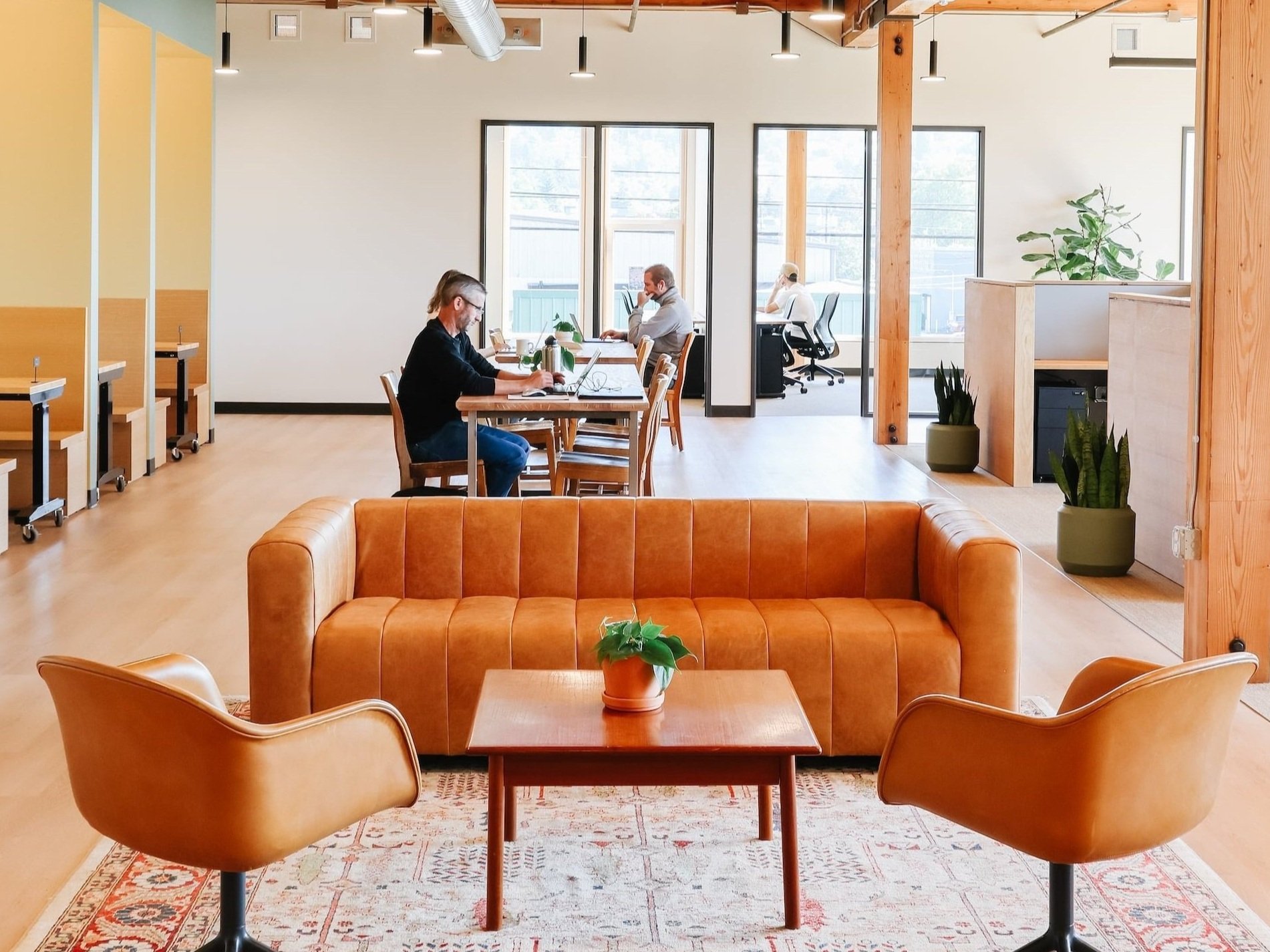What is Coworking?
Coworking (sometimes called co-working) is an umbrella term referring to independent professionals and small teams sharing a work environment. Other words are sometimes used interchangeably to describe coworking including:
Collaborative workspace
Shared workspace
Flexible workspace
Workshare
Flex office
Shared office space
Desk-sharing
Hot-desking or hoteling
Business center
Executive suites
Benefits of Coworking
Superior Economics: Both companies and individuals achieve significant savings by coworking because their pricing is aligned with their use of resources and high fixed real estate costs are distributed across the community. Rather than paying by the square foot 24 hours per day 365 days per year for a conference room they only use a few times a week, they only pay for the hours during which they are meeting.
No long-term commitments: Coworking spaces offer flexible rental agreements that allow individuals and small businesses to scale their office space up or down depending on their needs, without committing to long-term leases or contracts.
Socialization, productivity, and well-being: Remote work has left many people more isolated than ever. Coworking spaces offer an escape from the monotony, distractions, and loneliness of the home office. At TPC, we build separate zones into each location that are designed for deep focus work, collaboration, and socialization. Whether you are looking to buckle down and meet a deadline or chat with a coworker about weekend plans, there’s a place to do it.
Enhanced creativity: Coworking spaces provide a diverse and stimulating environment that can foster creativity and innovation, allowing individuals and small businesses to come up with new ideas and approaches. By pooling resources, members are able to access amenities and beautiful spaces that have historically been attainable only by large corporations with deep pockets.
Improved work-life balance: Coworking spaces provide a work environment that allows individuals to maintain a healthy work-life balance by providing opportunities for social interaction, networking, and collaboration, while also providing flexibility to work from home when needed.
A graph illustrating the rise in the searchable term "coworking" on Google since 2004. Numbers represent search interest relative to the highest point on the chart for the given region and time. A value of 100 is the peak popularity for the term. A value of 50 means that the term is half as popular. A score of 0 means there was not enough data for this term.
Who coworks?
Historically, the primary customers of coworking spaces were freelancers, startups, small businesses and solopreneuers. With the rapid adoption of remote work throughout the knowledge economy by companies of all sizes however, the addressable market has expanded to include all knowledge workers.
According to a report from FlexJobs, the number of remote workers in the US increased by 159% between 2005 and 2017. This simmer was accelerated to a boil when COVID forced rapid adoption of WFH and work from anywhere policies.
Larger companies are embracing remote work and coworking. According to a survey by Regus, 54% of respondents reported that their companies allow remote work and 56% of companies with over 1,000 employees use coworking spaces.
The pandemic has accelerated the growth of remote work and coworking. With the onset of the COVID-19 pandemic, many companies were forced to adopt remote work and coworking solutions to maintain operations. According to a survey by Global Workplace Analytics, remote work increased by 115% in the US between 2005 and 2020, and it is expected that 25-30% of the workforce will work from home multiple days a week by the end of the decade.
According to the Global Coworking Survey, the number of coworking spaces worldwide increased from 3,400 in 2013 to over 22,000 in 2019. There was some contraction during the COVID-19 pandemic, but supply of spaces is expected to grow over the next 5 years.
As covered in the Seattle Times, a 2023 Census Pulse survey showed that 1 in 3 Washingtonians were on a hybrid work schedule or were totally virtual, well above the national average of more than 1 in 4 and 40% of regional workers worked from home at least one day per week.
Some Helpful Definitions
Hot Desk - This is generally the entry-level tier of coworking membership and the least expensive. Members don’t have a dedicated workstation or office, but rather choose a seat each day in a communal workspace, similar to a cafe, but usually with business grade amenities. At TPC, our Community Full Time membership allows members unlimited hot desk use during business hours and our Community Part Time membership gives members 8 hot desk use-days each month. At most spaces, some level of amenities like coffee, tea, printing and phone booth usage will be bundled into the price.
Dedicated Desk - This is the next tier up from hot desk memberships and includes a dedicated workstation, longer access hours (usually 24/7), room for monitors and other equipment, and more access to amenities. At TPC, our Resident Desk membership includes a dedicated desk, a designer task chair, meeting room credits, and 24/7 access.
Team Bundle Membership - A combination of hot desk and dedicated desk memberships designed to be shared by two our more members. This is a great option for teams that don’t need dedicated private space, or can be bundled in combination with a private office to achieve the benefits of “touchdown space” plus expandable flex space for hybrid and remote employees to drop in as needed.
Private Office - A dedicated private space for individuals and small teams with access to shared amenities. Offices can be combined with other memberships to serve larger teams. Unlike traditional office space, coworking offices don’t require 5-10 year leases, personal financial guarantees, or costly buildouts. They can be configured and move-in ready in a number of days, not months. TPC offers private offices at all of its locations in Seattle and Tacoma.
Meeting Room Rental - Available on-demand with no membership required, a la carte meeting room rentals are a great way for remote employees to get together regularly to meet and collaborate, while avoiding the high fixed costs associated with maintaining a dedicated meeting space. Companies with traditional office space can also benefit by scheduling regular offsite creative days, trainings, and team-builders. TPC offers meeting spaces of different sizes for rent by the hour and the day.
What differentiates The Pioneer Collective?
We believe our physical surroundings have a tremendous impact on our productivity and creativity. Our mission is to create an inspired shared office space that brings together people who have the freedom to work remotely but prefer the camaraderie of others. We encourage a mix of professionals from a variety of backgrounds to cultivate a diverse work environment. We value character and high-quality design.
When we founded TPC, we set out to build out as much of the space by hand as we could. What we couldn't build ourselves was carefully sourced from a select group of manufacturers, fabricators and second hand furniture dealers. An independent, single location coworking space, TPC has been customized to reflect the storied history and dynamic present of Seattle and the Pioneer Square neighborhood. A detailed list of amenities and benefits of coworking at the Pioneer Collective are outlined further on our membership page.
Members meet at TPC’s original flagship location in Pioneer Square.



